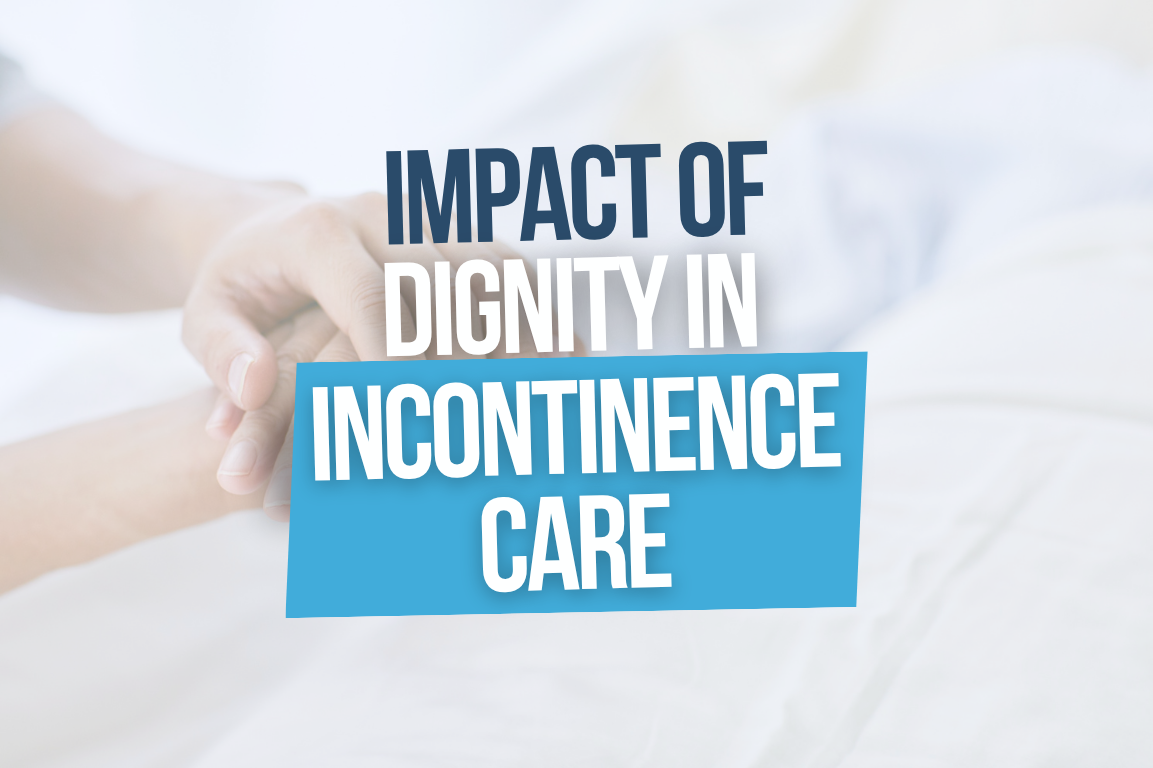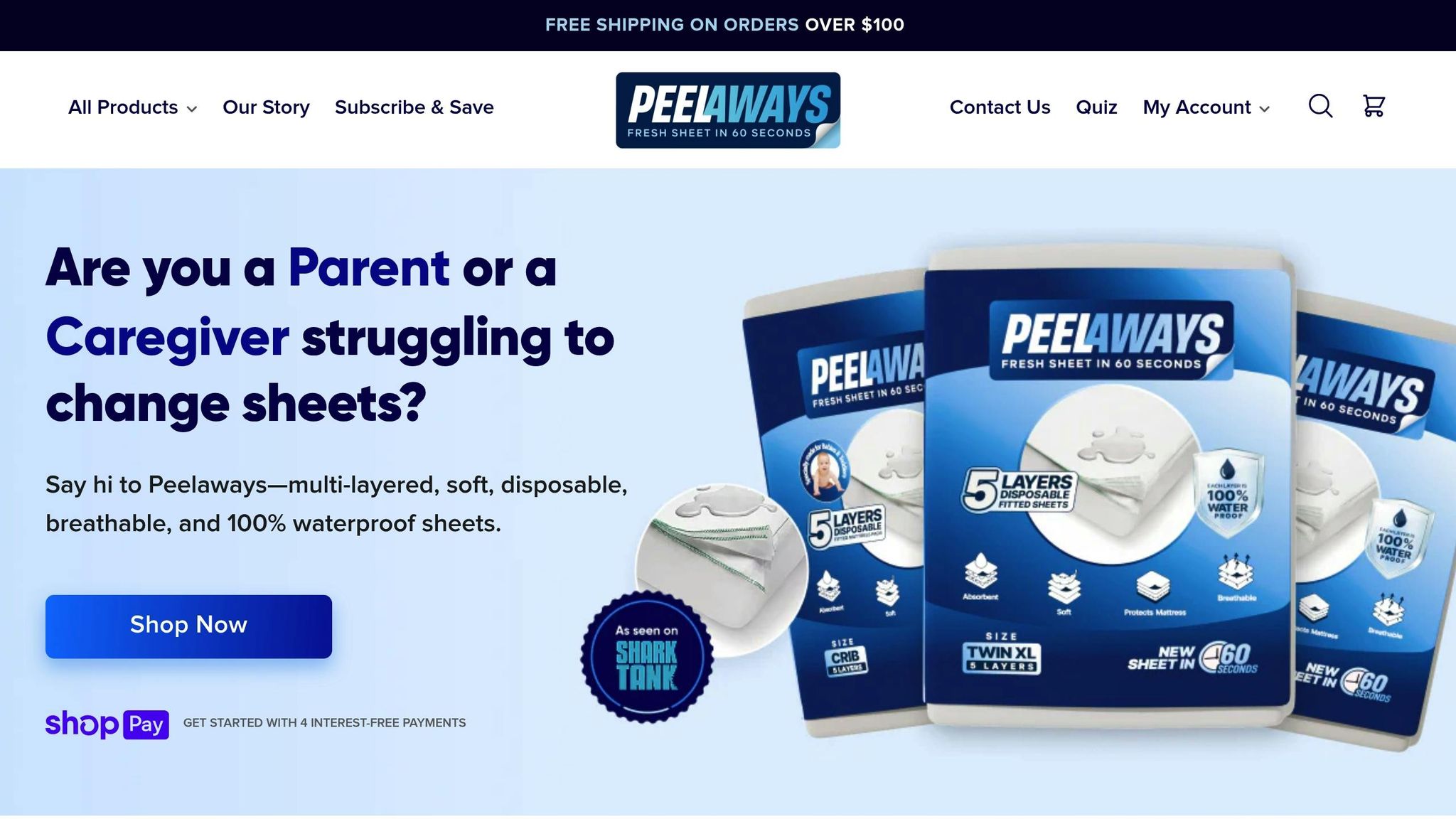Study: Impact of Dignity in Incontinence Care

Dignity in incontinence care is about treating individuals with respect, privacy, and empathy, ensuring their emotional and physical well-being. When caregivers prioritize dignity, they help reduce feelings of shame, isolation, and anxiety often associated with incontinence. This approach improves cooperation, emotional health, and quality of life for both individuals and caregivers.
Key takeaways:
- Why it matters: Ignoring dignity can lead to depression, withdrawal, and even physical discomfort.
- Challenges: Caregivers face burnout and stress when dignity is neglected.
- Solutions: Practices like maintaining privacy, respectful communication, and involving individuals in care decisions make a big difference.
- Practical tools: Products like PeelAways disposable bed sheets simplify care, reduce disruptions, and support hygiene.
Dignity-focused care benefits everyone involved, creating a more supportive and respectful caregiving environment.
Iatrogenic incontinence in institutional care settings. ICS Podcast

Effects of Poor Dignity Practices in Incontinence Care
When dignity is overlooked in incontinence care, the consequences ripple through every aspect of life - affecting relationships, mental health, and overall quality of life. Research consistently highlights that ignoring dignity in care practices causes harm not just to the individuals receiving care but also to their caregivers. These impacts go beyond the immediate care setting, influencing treatment outcomes and emotional well-being.
Undignified care doesn’t just complicate incontinence management - it can make the experience deeply traumatic. This underscores why maintaining dignity is critical for both patients and caregivers. By understanding the harm caused by neglecting dignity, we can see why respectful, patient-centered approaches are essential for effective care.
Impact on People with Incontinence
One of the most profound consequences of undignified care is psychological trauma. When care feels rushed or impersonal, individuals often feel dehumanized and ashamed. This sense of humiliation can linger long after the care interaction is over, leaving a lasting emotional scar.
For many, this emotional toll manifests as depression and anxiety. Feeling like a burden, some individuals withdraw from social activities out of fear of embarrassment or judgment. These feelings of isolation become even more pronounced when people internalize the negative experiences of undignified care, leading them to question their worth and independence.
A lack of involvement in their own care decisions further compounds the issue. When caregivers fail to include individuals in discussions about their routines, it strips them of autonomy and control over their own bodies. Over time, this can lead to learned helplessness, where individuals stop expressing their preferences or advocating for their needs altogether.
Physical discomfort often accompanies this emotional distress. Rushed care can result in poor hygiene practices or rough handling, causing skin irritation and other preventable issues. When individuals feel too demoralized to voice their discomfort, these problems can escalate. Worse, feelings of humiliation during care interactions may lead some to resist necessary treatments or delay seeking help, further complicating their condition.
But the challenges don’t stop with the individuals receiving care - they extend to the caregivers, too.
Caregiver Challenges
Caregivers in environments that fail to prioritize dignity often face emotional exhaustion, moral distress, and strained relationships. Many witness the harm caused by undignified practices but feel powerless to change due to time pressures or insufficient training. This internal conflict can lead to job dissatisfaction, burnout, and high turnover rates.
Undignified care also makes caregiving more challenging. Individuals receiving care may become resistant, withdrawn, or uncooperative, creating a cycle where stressed caregivers struggle to provide attentive, respectful care. This dynamic only worsens the relationship between caregiver and patient, making the job feel less rewarding.
Another common issue is the lack of proper training in dignity-focused care. Without understanding the emotional impact of their actions, caregivers may inadvertently cause distress. This knowledge gap leaves many feeling unprepared and inadequate, further fueling professional dissatisfaction.
Family caregivers face unique struggles in these situations. Watching a loved one lose confidence and retreat from activities they once enjoyed can lead to feelings of guilt and grief. The emotional strain of providing care that feels insufficient or harmful can damage family relationships and contribute to caregiver anxiety and depression.
Over time, caregivers - whether professional or family - may develop compassion fatigue. This emotional numbness, while a coping mechanism, reduces their ability to connect with and support those they care for. Ultimately, it diminishes the quality of care provided, perpetuating a cycle of harm and disconnection.
Research-Based Practices for Dignity-Focused Care
The negative impact of undignified care is well-documented, but research now points to clear, actionable practices that can restore respect and trust, especially in incontinence care. These strategies focus on respectful communication, involving individuals in their care, and creating supportive environments - all of which lead to better outcomes.
Studies highlight that dignity-focused care reduces stress, strengthens relationships, and improves overall health. At its core, dignity in care is about more than just politeness. It’s about seeing the person beyond their condition and tailoring care practices to honor their humanity.
Core Practices for Dignity Preservation
Dignity-focused practices address both the emotional and practical challenges of care. At the heart of these practices is privacy, which creates a sense of safety and respect. Small actions, like knocking before entering a room or asking for permission before starting care tasks, can make a big difference in how care is experienced.
Effective communication is another cornerstone. Using person-first language, such as addressing individuals by their name rather than their condition, reinforces their identity and humanity.
Involving individuals in decisions about their care - even in small ways - helps preserve their sense of control. Asking preferences about timing, products, or procedures, or offering simple choices like selecting a protective product or scheduling care routines, fosters autonomy and respect.
The physical environment also plays a significant role. Ensuring the room is comfortable, with appropriate temperature and lighting, and minimizing exposure during care activities contributes to a sense of dignity and reduces stress. Research shows that these factors improve cooperation and ease during care interactions.
Gentle, deliberate movements paired with clear verbal communication help individuals feel valued and in control, reducing anxiety and building trust.
Cultural awareness adds depth to dignity-focused care. Understanding and respecting cultural norms around privacy, touch, and bodily functions allows caregivers to provide more personalized care. This might mean adjusting communication styles, respecting modesty preferences, or accommodating religious practices.
Taking time for care activities is another key aspect. Rushed care often feels impersonal and undignified. By slowing down, caregivers can focus on both the physical and emotional needs of the individual, creating a more respectful and comfortable experience.
Training and Support Requirements
Empathy, communication, and person-centered care are skills that can be taught, and training in these areas has been shown to improve both care quality and satisfaction. Caregivers need to understand not only the technical aspects of care but also how their approach affects the emotional well-being of those they serve. Recognizing signs of distress, understanding the psychological effects of incontinence, and providing emotional support are all crucial components of training.
Organizational policies must reflect dignity-focused principles. Clear guidelines on privacy, communication, and time allocation empower caregivers to consistently prioritize dignity in their work.
Regular supervision and feedback are essential for maintaining high standards. Observing interactions, offering constructive feedback, and celebrating excellent care practices create a positive culture where dignity is a priority.
Caregivers also need ongoing support systems to prevent burnout and maintain the quality of care. Access to counseling, peer support groups, and regular training updates ensures caregivers feel valued and supported, which in turn allows them to provide compassionate care.
For family caregivers, training should address both the practical and emotional aspects of care. Many family members feel overwhelmed by the responsibility of incontinence care. Programs that teach practical skills while also addressing emotional challenges help families maintain their relationships and uphold dignity for their loved ones.
Finally, quality assurance measures ensure dignity-focused practices are upheld. Regular assessments, feedback from care recipients and families, and continuous improvement efforts help close gaps in care delivery. These practices not only enhance mental health and satisfaction but also create a foundation for better care overall.
sbb-itb-45288fe
Results of Dignity-Focused Incontinence Care
Studies reveal that care centered on dignity leads to better outcomes for individuals managing incontinence. By emphasizing a person-first approach, this type of care enhances emotional well-being and overall satisfaction. The positive effects extend beyond physical health, touching on psychological and lifestyle improvements that significantly impact daily life.
Improved Mental and Emotional Well-Being
One of the most noticeable benefits of dignity-focused care is its ability to ease the emotional burden often tied to incontinence. By prioritizing respectful communication and safeguarding privacy, caregivers help reduce feelings of shame and embarrassment. These thoughtful practices not only boost self-esteem but also promote emotional stability. Additionally, they help alleviate anxiety and depressive symptoms, creating an environment of trust between caregivers and those they assist. This emotional support plays a vital role in increasing satisfaction with care.
Enhanced Quality of Life and Satisfaction
When individuals feel respected and valued, their overall quality of life improves. Those receiving dignity-focused care often report greater enjoyment in their daily routines and a stronger connection to their living environment. Better sleep, meaningful social interactions, and a sense of preserved personal identity all contribute to a more fulfilling care experience. This respectful approach also encourages independence, further enriching the overall satisfaction with care services.
Practical Solutions Supporting Dignified Care
Caring for individuals with incontinence can be challenging, but modern tools are making it easier to provide support while maintaining dignity and hygiene. These advances address common caregiving hurdles, ensuring respectful and efficient care. Let’s explore how PeelAways products contribute to these goals.
Simplifying Care with PeelAways

PeelAways disposable waterproof bed sheets are a game-changer for incontinence care. Their patented multi-layer design - offering 5 to 7 absorbent layers depending on the size - allows caregivers to simply peel off a soiled top layer to reveal a fresh, clean sheet underneath.
This innovative approach eliminates the need for traditional bedding changes, which often require lifting individuals and can be physically demanding. Instead, caregivers can quickly remove a single layer with minimal disruption, preserving the individual’s comfort and privacy. The built-in waterproof barrier ensures that liquids don’t reach the mattress, while also reducing odors and preventing bacterial growth - key to maintaining hygiene and avoiding cross-contamination.
For families managing incontinence at home, this design is particularly convenient during unexpected situations. Each fresh layer provides a clean, hygienic surface without the hassle of stripping and replacing an entire fitted sheet.
PeelAways are available in various sizes to meet different needs. Pricing starts at $30.99 for Crib-A-Peel sheets, with King size sheets at $53.99. The Twin XL option offers up to 7 layers, ideal for extended care, while other standard sizes typically provide 5 layers. These features emphasize efficiency, cleanliness, and respect - important elements of dignified care.
Practical Benefits of Modern Care Products
Modern solutions like PeelAways help uphold dignity in care by addressing three essential factors: speed, hygiene, and discretion. Traditional sheet changes can be cumbersome, often requiring extra help, extensive maneuvering, and prolonged exposure that may cause discomfort or embarrassment.
PeelAways simplify this process, allowing caregivers to perform quick bedding changes. This efficiency not only reduces physical strain but also frees up time for meaningful interactions and emotional support. For family caregivers, this ease of use makes it possible to handle these situations independently.
Additionally, the discreet nature of PeelAways supports a sense of normalcy for those receiving care. Swift and seamless transitions minimize disruptions, helping individuals feel more at ease. By prioritizing privacy and comfort, these products contribute to the emotional well-being of those in care.
Whether in healthcare facilities or at home, these modern caregiving tools reflect a shift toward more person-centered care, empowering caregivers to handle incontinence incidents with confidence and respect.
Conclusion: Key Study Findings
The research highlights how dignity-focused care reshapes incontinence care into a compassionate and person-centered experience. When caregivers prioritize respect, privacy, and emotional well-being, the positive effects ripple through, enhancing the overall emotional health of those receiving care.
Studies repeatedly show that undignified care practices can lead to a range of negative outcomes. People subjected to such care often experience heightened anxiety, depression, and social isolation, while caregivers are more likely to encounter increased stress, burnout, and a decline in the quality of care they provide.
On the other hand, dignity-focused care brings clear benefits. When care centers on respect, open communication, and emotional support, individuals report better mental health and greater satisfaction with their care.
Practical solutions also play a crucial role in supporting dignified care. Innovations like PeelAways offer a way to address incontinence challenges without compromising dignity. These products reduce the need for disruptive bedding changes, allowing caregivers to manage incidents quickly and discreetly. The peel-away design not only saves time but also helps maintain comfort and privacy for the individual during care.
FAQs
How does focusing on dignity in care improve the well-being of individuals with incontinence?
Focusing on dignity in incontinence care plays a key role in improving emotional and mental well-being. By emphasizing respect, empathy, and personalized support, this approach helps minimize feelings of embarrassment, isolation, and low self-esteem. It also encourages independence and bolsters self-confidence.
When incontinence is managed with sensitivity and understanding, individuals feel valued and supported. This can help ease the anxiety and depression that often accompany the condition. In the end, care rooted in dignity strengthens a sense of self-worth and enhances overall quality of life.
How can caregivers provide dignified care for individuals with incontinence?
Providing care for individuals with incontinence begins with establishing a regular toileting routine, such as encouraging bathroom visits every 2–3 hours. This approach not only helps reduce accidents but also supports their sense of independence. Equally crucial is maintaining a calm, respectful, and empathetic demeanor, steering clear of words or actions that might lead to feelings of shame or embarrassment.
Caregivers can also uphold dignity by using discreet and comfortable incontinence products, ensuring privacy during care, and prioritizing the person’s emotional needs. Simple actions like making eye contact, actively listening, and focusing on their comfort can go a long way in preserving their self-esteem and sense of autonomy.
How do PeelAways sheets help maintain dignity and hygiene in incontinence care?
PeelAways sheets offer a practical and discreet way to maintain dignity and hygiene in incontinence care. With their multi-layer peel-away design, caregivers can simply remove the soiled top layer to reveal a fresh, clean sheet underneath - no need to lift the mattress or deal with cumbersome laundry.
This thoughtful design not only reduces discomfort and embarrassment for individuals but also helps lower the risk of cross-contamination. Whether in elder care, medical recovery, or other sensitive settings, PeelAways make it easier to create a clean and respectful environment with minimal effort.
Related Blog Posts
- 7 Essential Tips for Nighttime Incontinence Care
- 7 Tips for Preventing Skin Irritation from Incontinence
- Why Organic Waterproof Bedding Matters for Incontinence Care
- Why Respect Matters in Incontinence Conversations
Comments
0

SAVE MONEY & WATER
Professionals & Institutions save a fortune on labor/laundry.

SUPERIOR COMFORT
The first thing our customers notice is how soft our sheets are.

100% WATERPROOF
Each layer is 100% Waterproof, perfect for spills and accidents

SAVE TIME
Change the sheet in under 1 minute without stripping the bed.




Leave a comment